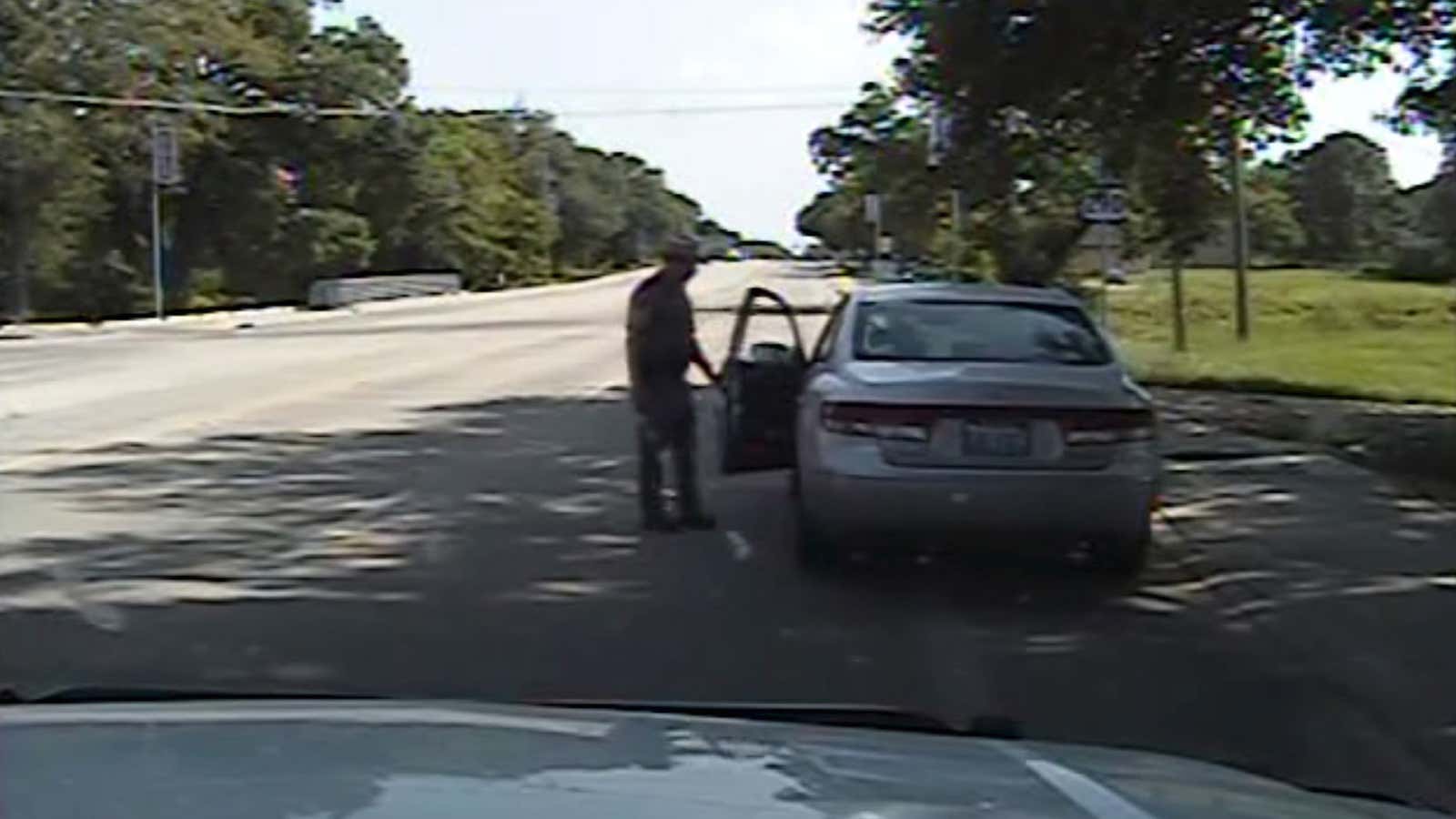When Sandra Bland, the 28-year-old woman who was later found dead in a Texas jail cell, was pulled over for failing to signal while changing lanes on July 10, she refused to get out of the car. “I’m not under arrest,” she told state trooper Brian Encinia. “You don’t have the right to take me out of the car.”
When Encinia insisted, their interaction escalated into the violent scene that would spread quickly across social media following her mysterious death.
In the month prior, Bland had been outspoken against police brutality and racism on her Facebook page. Her profile picture, uploaded just after the United States Supreme Court legalized gay marriage in America on June 27, is black text against a white background: “Now legalize being black in America.”
There are plenty of recent instances of racist policing across America—from New York City’s Stop and Frisk patrolling tactic, to several fatal police shootings including Walter Scott, a black South Carolinian shot during a traffic stop in April; Samuel Dubose, another black man shot by a University of Cincinnati police officer in July; and Freddie Gray, the 25-year-old who died from injuries sustained while being transported by Baltimore police officers in April.
Between 2003 and 2009, more than 1,500 blacks have died during their arrest, according to a 2011 report from the US Bureau of Justice Statistics. That’s about 32% of all arrest-related deaths; whites, who were arrested more than twice as often in the same period, accounted for 40%.
Given these numbers, it’s no wonder Bland preferred to stay in her car.
Unfortunately for her—and for anyone else who is pulled over and asked to step out of their car—her rights are murky. Even though the Fourth Amendment guarantees citizens will not be subjected to unreasonable searches and seizures, it hasn’t been able to protect drivers from this particular invasion of privacy since 1977.
Two major Supreme Court decisions in the past half-century have eroded the Fourth Amendment’s power in an effort to protect police in the line of duty.
In the 1967 case Terry v. Ohio, the Court ruled that Cleveland police detective Martin McFadden did have the right to stop and search two suspicious-looking men in the street, even though they had not committed crimes.
The Court held:
“Where a reasonably prudent officer is warranted in the circumstances of a given case in believing that his safety or that of others is endangered, he may make a reasonable search for weapons…regardless of whether he has probable cause to arrest that individual for crime or the absolute certainty that the individual is armed.” (emphasis added)
Ten years later, the Supreme Court further weakened the protections afforded by the Fourth Amendment by applying the precedent set in Terry to a traffic situation, in Pennsylvania v. Mimms.
In that 1977 case, Harry Mimms had been arrested after an officer found him in possession of an unlicensed handgun during a routine traffic stop. The officer first noticed the gun—a bulge in Mimms’ jacket—when Mimms stepped out of his vehicle at the behest of the officer.
Citing a line from the majority opinion in Terry that read, “Certainly it would be unreasonable to require that police officers take unnecessary risks in the performance of their duties,” the Court upheld the arresting officer’s right to ask driver Mimms to exit his car.
The Court elaborated: “The order to get out of the car, issued after the respondent was lawfully detained, was reasonable and thus permissible under the Fourth Amendment,” reasoning that “intrusion into respondent’s personal liberty occasioned by the order, being at most a mere inconvenience, cannot prevail when balanced against legitimate concerns for the officer’s safety.”
Both Supreme Court decisions allow an officer’s interpretation of a situation to override civilian rights “to be secure in their persons, houses, papers, and effects, against unreasonable searches and seizures” listed in the Fourth Amendment. Today, a police officer may ask a citizen pulled over for a traffic violation to step out of their car without giving any reason.
Although the founding fathers never had to contend with cars, that doesn’t mean they never considered the great vulnerability that comes with facing a stranger in uniform on an empty road. The Bill of Rights was designed to give citizens some measure of personal privacy. By weakening these historic protections in order to prioritize the safety of police officers, the Supreme Court seems to have put some American citizens in mortal danger.




